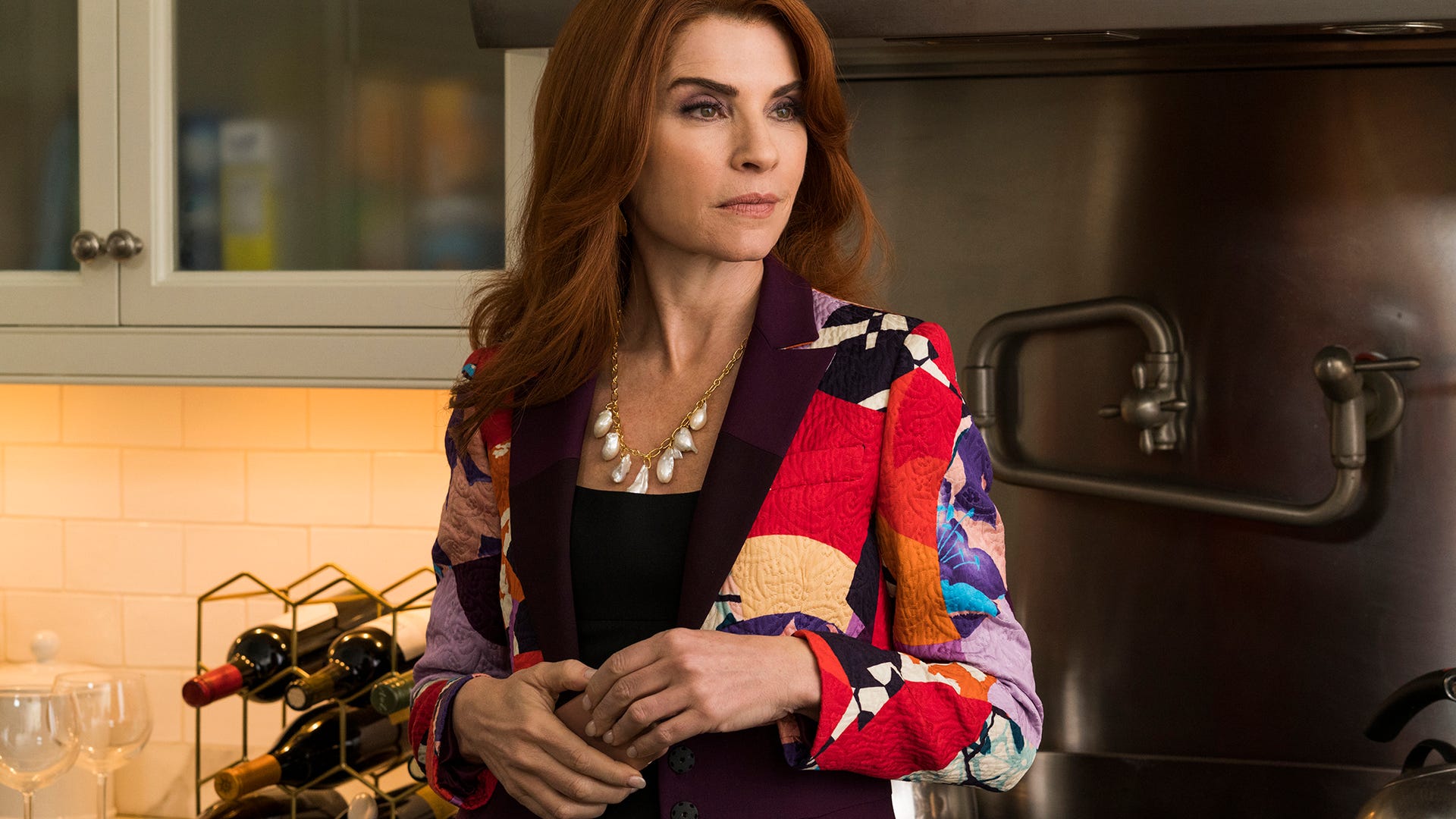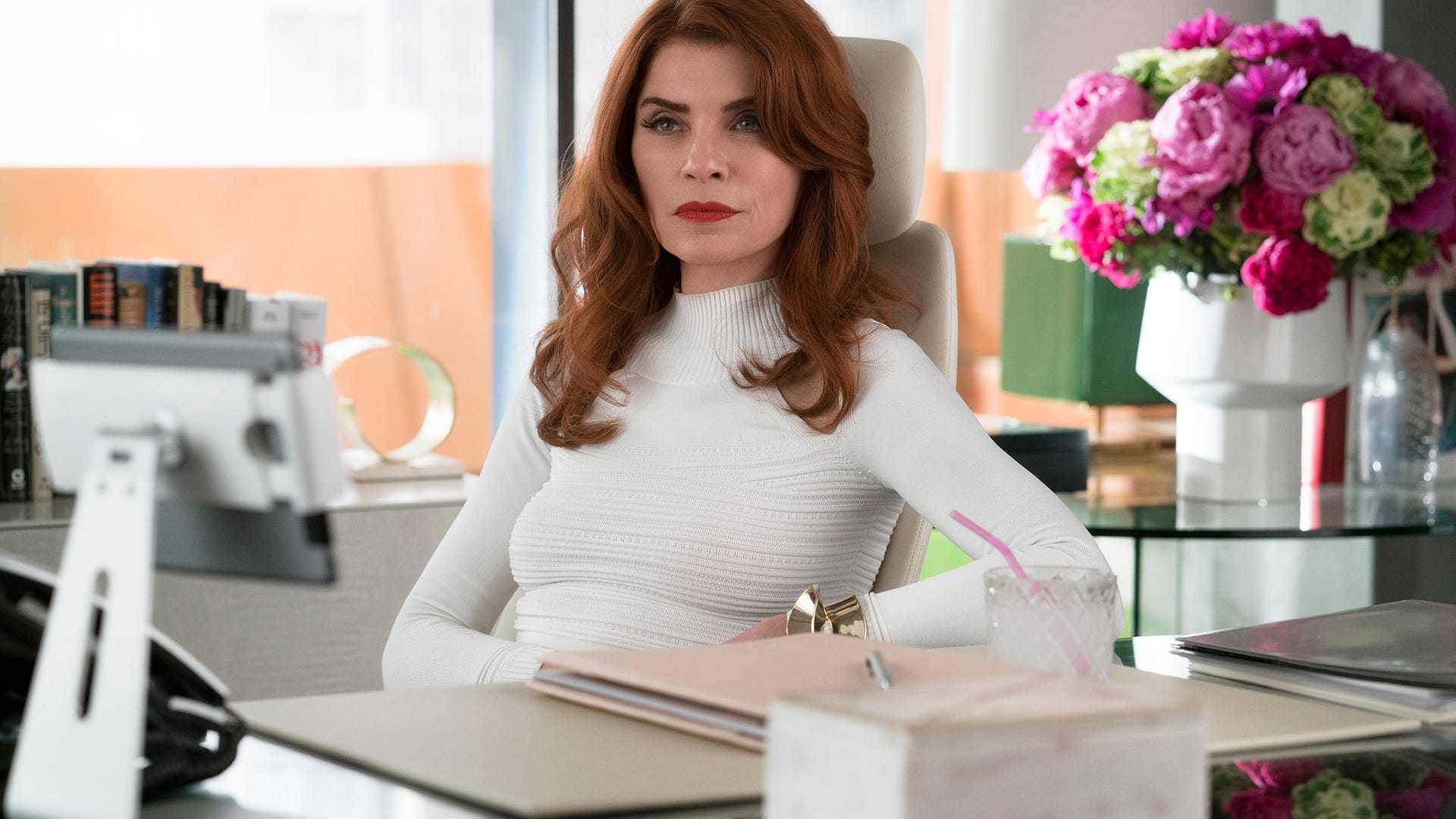Join or Sign In
Sign in to customize your TV listings
By joining TV Guide, you agree to our Terms of Use and acknowledge the data practices in our Privacy Policy.
Julianna Margulies Is Great in Dietland, but the Bitch Editor Trope Needs to Die
Surely there's another way to run a magazine
You don't have to watch Dietland, AMC's dramedy about feminist vigilantes who start offing men, to know its catty anti-hero Kitty Montgomery (Julianna Margulies). She is the editor of the young women's magazine Daisy Chain and thus apparently required to be a thin, middle-aged, slightly bitter, immaculately dressed woman who hisses at underlings as she sashays down the hall at work. By her dialogue ("I want Rihanna for the cover!") and spacious office, she clearly wields enormous power. She is single. She worries about age spots, and stans cutting edge fitness fads. This about sums up Kitty Montgomery, but it could also be Wilhelmina Slater (Vanessa Williams) from Ugly Betty or maybe Enid Frick (Candice Bergen) from Sex and the City. They're indistinguishable, really; each Bitchy Editrix is a slight variation of the one before her, like some never-ending May issue that says, yet again, florals are in for spring.
Julianna Margulies makes Kitty glisten, but Julianna Margulies can make a blank stare feel like a concert. Unfortunately, blank stares, or at least the verbal equivalent of them, is the summation of what Kitty does in Dietland's early episodes (four were screened to critics). This isn't Margulies' fault -- she is based on a real but unidentified person in Sarai Walker's book upon which the series is based -- and Margulies makes Kitty's Bitchy Editrix feel crisp and adequately frosty. Kitty's redundancy may not be the fault of executive producer Marti Noxon either. She has said Kitty is in part informed by -- in case you couldn't tell -- The Devil Wears Prada's Miranda Priestly, the all-time greatest Bitchy Editrix who was immortalized by Meryl Streep onscreen. But Miranda was hardly the first B.E. implanted in the pop culture consciousness. Previous iterations include the hilariously demented Patsy Stone (Joanna Lumley) of Absolutely Fabulous, or the aging rock star Nina Van Horn of Just Shoot Me, played with panache by Wendie Malick. With the exception of maybe Murphy Brown, a one-of-the-boys gal who was more into Cronkite than Chanel, there have been so few variations from the bombshell, power-hungry editor type that it now seems like the only version of a woman editor viewers will believe.

Julianna Margulies, Dietland
Patrick Harbron/AMCOn Dietland, Kitty may or may not be a target of, or possibly in cahoots with, a collective named Jennifer that's been kidnapping and murdering awful men. Caught in this net with Kitty is her freelancer Plum Kettle (Joy Nash), who ghostwrites Kitty's insipid column about makeup and boys. Plum is a type unto herself: the ugly duckling (because of her weight) on the receiving end of tutelage and casual cruelty from Kitty. "I always forget what beautiful eyes you have," she purrs to Plum in the first episode -- the clue that their dynamic is built on shade and mutual resentment. Plum's eyes are the only thing about Plum that Kitty can bear to look at, let alone compliment, and in Kitty's presence, Plum remains forever reduced. Kitty's anti-feminism is anti-subtle, and as the season progresses, Plum gets seduced by Jennifer, which potentially pits Plum and Kitty against each other outside the professional sphere. But the show also hints that the passive-aggressive rivals may be good for each other in some kooky way that doesn't come from a place of affection. So, basically: catfight, frenemies or crazy mother-daughter Grey Gardens vibe -- a trio of restrictive, predictable options that are as oppressive to Kitty and Plum as they are the viewer. Plum deserves a better boss, and so do we.
Julianna Margulies Goes Full Devil Wears Prada in Dietland
Kitty, like the army of Bitchy Editrixes before her, mines painful truths that elsewhere have made for good comedy. Pretty much every woman this male writer knows has said they feel obligated to don armor at work just to get a baseline level of respect. Combine that with the romanticized idea of the magazine editor and it's easy for this fantasy of a Cersei Lannister-type magazine dynamo to crystallize. At the risk of mansplaining, the day-to-day mechanics of running a magazine -- or more realistically today, a profitable digital media company -- is mostly tedium like making schedules, approving photo spreads, parsing a numbing amount of data and a string of endless meetings. None of that makes good TV of course (although E!'s So Cosmocame close), so if a show is going to have a female editor at the top of the food chain she needs to visually communicate pristine taste and unshakable strength and, well, voilà, here's Bitchy Editrix whipping her stunning mane to stare down a peon for failing to hand her an espresso on command.
The Bold Type Is Destroying Toxic Stereotypes About Women in the Workplace

Julianna Margulies, Dietland
Patrick Harbron/AMCTo be fair, this type has so much potential for good comedy, because this person is always at some breaking point, always preoccupied with relevancy. That lets Kitty say drastic things like she had her chef cut everything white out of her menu after menopause. But over time, this cut and paste set of traits and ticks, which almost always include built-in tension with other women, have calcified in way to make even writers and producers think the bitter shrew is the only type of female editor there is. Supergirl's Cat Grant (Calista Flockhart) stopped being a hardass over time to truly guide Kara (Melissa Benoist) out of genuine care, but she was undoubtedly a monster at one time. The Bold Type's Jacqueline (Melora Hardin) is, right now, the gold standard for disrupting this narrative; she's tough on the work but good to her people. And Tina Fey took a stiletto heel to the ice queen editor stereotype on the sadly canceled Great News, playing Diana St. Tropez, a spot-on parody of titans like Arianna Huffington or Sheryl Sandberg who's so perfect she birthed her children on planes so they'd be citizens of the world. Still, she made it a mission to mentor young women and was intentionally ridiculous; they both show women editors as flawed and funny without being cruel and obsessed with cosmetics at the expense of everything else. But those are exceptions.
Having worked with, and been mentored by, dozens of talented, multi-dimensional female editors (including my current one), I know firsthand the Bitchy Editrix trope continues to rely on a fixation with status and external validation that overlooks the managerial, strategic, business, editorial and cultural acumen editors need 24/7. It also forgets the encouragement these women naturally brought to the office that improved the work as well as the frequent babysitting (of men, usually -- including me on a bad day) they did with admirable grace. Most were just plain exhausted -- a greatly underused territory for comedy in itself -- and/or moms who somehow juggled publishing's insane demands while raising children. Sometimes they came to work in messy hair, jeans with mustard stains or without a full face of makeup because, well, none of that had anything to do with good journalism or wooing advertisers. Where is that editrix -- she who's great at her job, maybe plays video games, wears sweatpants when prudent and doesn't bark at people to flex her power? Queen Latifah, who was Living Single's urbane, confident and cool publisher Khadijah James, was a terrific example of a warm, chummy but still tough editor who wasn't a bitch. That was 20 years ago, and we've only seen few characters follow in her footsteps.
Dietland's Kitty wholeheartedly believes that the right lip gloss and slimming dress arms her readers -- "my girls" as she constantly calls them -- with all the tools they need to make it, an antiquated idea that becomes even more implausible in Dietland as Jennifer ramps up its terror campaign. Kitty is supposed to be funny. She could be in different circumstances; she might have been once upon a time. But now Kitty is sad -- a reminder that even fictional female bosses still get placed into tiny boxes, and that creatives who shaping important imagery and narratives haven't yet given this trope the makeunder it desperately needs.
Dietland airs Mondays at 9 p.m. on AMC.
